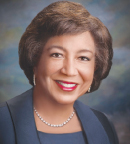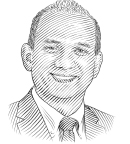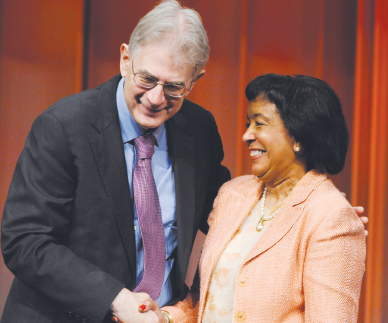
Edith Peterson Mitchell, MD

Guest Editor Jame Abraham, MD, FACP. Dr. Abraham is the Director of the Breast Oncology Program at Taussig Cancer Institute, and Professor of Medicine, Lerner College of Medicine, Cleveland Clinic.
For this installment in the Living a Full Life series of articles, Edith Peterson Mitchell, MD, was interviewed by Guest Editor Jame Abraham, MD, FACP. Dr. Mitchell is Clinical Professor of Medicine and Medical Oncology in the Division of Medical Oncology at Thomas Jefferson University as well as Associate Director for Diversity Programs and Director of the Center to Eliminate Cancer Disparities for the Sidney Kimmel Cancer Center at Jefferson.
EDITH PETERSON MITCHELL, MD, built her noted oncology career upon the time-honored maxim of service to others, with special attention to patients in medically underserved areas. Dr. Mitchell’s service extended to the U.S. military; she retired as a Brigadier General, the first female physician to attain this rank in the history of the U.S. Air Force.
Reared on a Farm
“I GREW UP on the very farm my great-great-grandmother purchased in 1865, when the slaves were freed. All of the female ancestors in my family were wonderful cooks, and their talent and recipes were passed down the line. Cooking and sharing good food with friends and family is one of my true joys,” said Dr. Mitchell. She added: “I actually found one of my daughter’s school ledgers from first grade in which she wrote about her mother being a doctor but also how good her mother’s pound cake was. So it has become somewhat of a signature dish and a favorite of my grandchildren.”
Dr. Abraham asked about Dr. Mitchell’s inspiration to become a doctor. “I decided to become a doctor when I was 3 years old,” she shared. “I lived on the farm that had been inherited by my great-grandfather, who was 89 years old at the time. He became very ill, and at that time, the hospitals were totally segregated, so the family decided to care for him at home. Dr. Logan was an African American doctor who made house calls carrying his black medical bag. I was so impressed by his demeanor and skill that I wanted to become a doctor like him. I remember he took the time to sit down with me and explained I could become a doctor if I worked hard enough.”
EDITH PETERSON MITCHELL, MD
- Affiliation: Clinical Professor of Medicine and Medical Oncology; Associate Director for Diversity Programs and Director of the Center to Eliminate Cancer Disparities, Sidney Kimmel Cancer Center at Jefferson
- Military service: Retired Brigadier General, the first female physician to attain this rank in the history of the U.S. Air Force
- Favorite hobby: “I’m passionate about cooking. I’ve so far collected hundreds of ethnic cookbooks. I read cookbooks as novels because of the historical information and background. I also enjoy gardening and collecting quilts.”
- Professional honor: “I was privileged to be named among the 28-member Blue Ribbon Panel [for the National Cancer Moonshot Initiative] and look forward to the impact of the ‘Moonshot’ on cancer research and outcomes.”
Never Wavering From Medicine
DR. MITCHELL MAINTAINED her medical career aspirations throughout grade school and high school, graduating as class valedictorian and earning her BS in biochemistry (with distinction) from Tennessee State University in 1969. In 1972, she entered the Medical College of Virginia. “In the pathology laboratory in medical school, I immediately became fascinated by looking at cancer cells under the microscope and seeing how they differed from normal cells. So, after some time in the lab working with cancer cells, I decided on a career in oncology,” she revealed.
In 1973, while attending medical school, Dr. Mitchell entered the Air Force and received a commission through the Health Professions Scholarship Program. She entered active duty after completing her internship and residency in internal medicine at Meharry Medical College and was on active duty while completing a fellowship in medical oncology at Georgetown University.
Asked about her decision to pursue oncology, Dr. Mitchell replied: “When I was first rounding on the clinical services, I talked to the cancer patients and asked about their pain and other symptoms. Back then, we didn’t have much to offer in the way of treatments, but I’d tell the residents about my experiences with patients and try to get some symptom-management relief for the patients. So it was my love of the lab and my early work with cancer patients that led me to a career in oncology,” said Dr. Mitchell.
Lifelong Passion to Ease Care Disparities
ALTHOUGH DR. MITCHELL’S WORK on chemoradiation for gastrointestinal cancers has raised the profile of radiation oncology, she is equally known for her work in underserved populations, which has been informed by her own personal experiences and research.
“Historic reasons have contributed to poor health care in certain American communities. For instance, segregation in the African American community prevented access to high-quality health-care facilities. This changed for the better with the 1965 passage of Medicare, which desegregated hospitals, both for physicians and patients. This progress continued throughout the 1971 National Cancer Act, the establishment of the clinical trials cooperative groups, and other areas, such as Surveillance, Epidemiology, and End Results. As data indicate, the gap in health-care access and outcomes between African Americans, other minority groups, and their Caucasian counterparts remains wide,” declared Dr. Mitchell.
“It was my love of the lab and my early work with cancer patients that led me to a career in oncology.”— Edith Peterson Mitchell, MD
Tweet this quote
She continued: “Consequently, if we are going to continue to see improvements in health outcomes and decreases in cancer incidence and mortality rates, we have to find ways to ensure equitable care among all of our nation’s communities, which means we need to give extra focus on the underserved.”
The Moonshot Initiative
IN 2016, Dr. Mitchell was named a member of the esteemed Blue Ribbon Panel to inform the scientific direction of former Vice President Joe Biden’s National Cancer Moonshot Initiative. Dr. Mitchell explained that she and fellow panel members were charged to consider how to advance the themes that were proposed for the initiative, such as the development of cancer vaccines, new approaches to early detection of cancer, advances in immunotherapy and combination therapies, single-cell genomic profiling of cancer cells and cells in the tumor microenvironment, and enhanced data-sharing.
“Minorities, especially African Americans, suffer a disproportionate burden of cancer in the United States, with higher incidence rates and poorer survival when compared with other racial and ethnic populations. The Moonshot Initiative may define prevention, diagnostic, and interventional strategies leading to cancer health-care equity. I was privileged to be named among the 28-member panel of experts and look forward to the impact of the ‘Moonshot’ on cancer outcomes,” she said.
Dr. Mitchell was the 2012 recipient of the ASCO Humanitarian Award for her voluntary and noncompensated humanitarian endeavors. “It is important to have spokespersons for health-care equity. But to make a difference, you need a platform, and I am truly glad that ASCO has provided such a platform for the issue of cancer care equity. To that end, the Society has made education of disparities of care along with guidelines a major educational goal. I was honored by the Humanitarian Award, but more than the personal recognition, the award helped continue and elevate the dialogue about reducing the gap between the haves and have-nots in health care,” said Dr. Mitchell.
A Soldier’s Life
ASKED ABOUT her military experience, Dr. Mitchell said: “I went to medical school on an Air Force scholarship and was supposed to give back 2 years for my scholarship. I loved it and thrived in the military environment, spending about 36 years in service, between active duty and reserves. During my service, I had quite a bit of influence in developing guidelines for the Air Force’s medical evacuation services program—something I’m proud of because it fills a vital service for our men and women who put their lives on the line to protect and preserve the freedom that we are privileged to enjoy in the United States.”
“If we are going to continue to see improvements in health outcomes and decreases in cancer mortality, we have to find ways to ensure equitable care among all of our nation’s communities.”— Edith Peterson Mitchell, MD
Tweet this quote
Dr. Mitchell stressed that the military is also essentially a minority population in the United States, with its own special needs. “I saw early on that our men and women who are sent to serve in various and frequently austere sections of the world have special medical needs. For my intense commitment to this issue, I was so privileged and honored to be promoted up through the ranks to Brigadier General. For instance, I initiated a women’s military health program and also participated in military health-care guidelines for transporting sick or wounded soldiers in military aircraft. All in all, I’m proud of my service, and it was an incredibly enriching experience,” shared Dr. Mitchell.
Finding Work/Play Balance
ALTHOUGH DR. MITCHELL acknowledged her career is very demanding, she grounds herself in family and hobbies. “I have three grandchildren, and there is always a lot going on with them. I’m also passionate about cooking; in fact, I must admit I’m a foodie. I’ve so far collected hundreds of ethnic cookbooks. As others might read novels, I read cookbooks,” she said with a laugh.
Dr. Mitchell also enjoys gardening, quilting, and listening to jazz and rock music while spending time with her family. She and her husband, Delmar, have been married for 48 years. “Just being with my family is the best way to de-stress,” she said.

Dr. Mitchell is a past recipient of ASCO's Humanitarian Award. Here she is shown receiving the award from ASCO Past President George W. Sledge, Jr, MD, FASCO, during the 2012 ASCO Annual Meeting. Photo by © ASCO/Phil McCarten 2012.
Although she’s fortunate to have many areas of her life that provide respite from the rigors of oncology, Dr. Mitchell is also aware of the potential for burnout among her colleagues. “I’m working with several of my associates on the challenge of physician burnout. We are not simply identifying burnout, but also trying to develop preventive strategies. It is vital as a community that we get behind this difficult issue, not just for our fellow oncologists and other providers, but also for our patients.”
The Power of Organizations
“ONE THING I’ve learned over my career is the power of using organizations to interact with others in your profession. This type of collaboration fosters a sense of community and also ways to share new ideas to better the way we deliver health care,” Dr. Mitchell said.
“I have a special place in my heart for the National Medical Association, for which I served as the 116th President from 2015 to 2016. The National Medical Association was formed in 1895 by an original group of 12 doctors, when blacks were denied membership in other professional medical organizations. And today, it is an organization that represents minority providers across the country and is dedicated to providing care to all patients who need it, across the full spectrum of needs.”
Dr. Abraham asked whether there were any mentors who stood out in her career. “I’ve been privileged to have had many wonderful mentors. For one, I had a supportive family, was the fifth of seven children, and learned a lot from my older siblings. But probably the most influential mentor was a teacher. I grew up in a farming community, where the schools were very small and racially segregated. My first-grade teacher, Mrs. Giles was surprised that my reading level was so advanced, so she gave me individual lessons. She actually mentored me up the educational ladder and encouraged me to work hard and attain any goals I set for myself. She made a true difference in my life, and I try to bring that same spirit to my own mentees,” said Dr. Mitchell. She added: “I’ve been blessed throughout my career, and once I decided to become an oncologist, I have never looked back.”
A SNAPSHOT OF DR. MITCHELL’S SERVICE IN THE U.S. AIR FORCE
- Dr. Mitchell is the first female physician to attain the rank of Brigadier General in the history of the U.S. Air Force.
- She served as the Air National Guard assistant to the command surgeon for U.S. Transportation Command and Headquarters Air Mobility Command (AMC), based at the Scott Air Force Base in Illinois. In this capacity, she served as Senior Medical Air National Guard Advisor to the command surgeon and was the medical liaison between the active Air Force and the Air National Guard.
- Her responsibilities included ensuring maximum wartime readiness and combat support capability of the worldwide patient movement and aeromedical evacuation system.
- Dr. Mitchell has been awarded more than 15 military service medals and ribbons, including the Legion of Merit, the Meritorious Service Medal, Air Force Achievement and Commendation medals, the National Defense Service Medal, and the Humanitarian Service Medal. ■
DISCLOSURE: Drs. Abraham and Mitchell reported no conflicts of interest.

